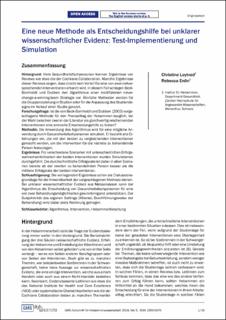Please use this identifier to cite or link to this item:
https://doi.org/10.21256/zhaw-4958| Publication type: | Article in scientific journal |
| Type of review: | Peer review (publication) |
| Title: | A new method supporting decision-making in case of unclear scientific evidence : test implementation and simulation |
| Authors: | Loytved, Christine Erdin Springer, Rebekka |
| DOI: | 10.21256/zhaw-4958 10.3205/zhwi000011 |
| Published in: | GMS Zeitschrift für Hebammenwissenschaft |
| Volume(Issue): | 2018 |
| Issue: | 5 |
| Issue Date: | 2018 |
| Publisher / Ed. Institution: | Deutsche Gesellschaft für Hebammenwissenschaft |
| ISSN: | 2366-5076 |
| Language: | English German |
| Subjects: | Algorithm; Intervention; Midwifery research; Algorithmus; Intervention; Hebammenforschung |
| Subject (DDC): | 610: Medicine and health |
| Abstract: | ABSTRACT
Background: Many health workers are aware of the results of reviews like those of the Cochrane Collaboration. Some results of these reviews show, at that stage of the research, no advantage for one of two promising interventions. In these cases, Beck-Bornholdt and Dubben propose a modified, never-change-a-winning-team algorithm. Similar algorithms are used in cases of study group assignments or adjustments to the design of a study in progress.
Research question: Is the method proposed by Beck-Bornholdt and Dubben in 2003 helpful for the daily work of midwives when they have to choose between two interventions with similar evidence of success?
Methodology: The application of the algorithm is being simulated for possible use by health workers. This includes all existing experiences made with both interventions to decide on the intervention for the next person to be treated.
Results: Simulations were carried out for various scenarios with different likelihood for success with regard to both interventions. It can be demonstrated that the average success rate in all scenarios is already improved starting with the second person treated, in comparison to the average success rate for both interventions.
Conclusions: The results can serve as a basis for discussion for the applicability of the suggested method. If the evidence is unclear, the algorithm can support the decision of health workers for one of two possible treatments, with positive effect. The special conditions of the setting in question (clientele, treatment realization) are hereby taken into account in each case. ZUSAMMENFASSUNG Hintergrund: Viele Gesundheitsfachpersonen kennen Ergebnisse von Reviews wie etwa die der Cochrane Collaboration. Manche Ergebnisse dieser Reviews zeigen, dass (noch) kein Vorteil für eine von zwei vielversprechenden Interventionen erkannt wird. In diesem Fall schlagen Beck-Bornholdt und Dubben den Algorithmus einer modifizierten never-change-a-winning-team Strategie vor. Ähnliche Methoden werden für die Gruppenzuteilung in Studien oder für die Anpassung des Studiendesigns im Verlauf einer Studie genutzt. Forschungsfrage: Ist die von Beck-Bornholdt und Dubben (2003) vorgeschlagene Methode für den Praxisalltag der Hebammen tauglich, bei der Wahl zwischen zwei in der Literatur als gleichwertig erscheinenden Interventionen eine sinnvolle Entscheidungshilfe zu bieten? Methodik: Die Anwendung des Algorithmus wird für eine mögliche Anwendung durch Gesundheitsfachpersonen simuliert. Er bezieht alle Erfahrungen ein, die mit den beiden zu vergleichenden Interventionen gemacht werden, um die Intervention für die nächste zu behandelnde Person festzulegen. Ergebnisse: Für verschiedene Szenarien mit unterschiedlichen Erfolgswahrscheinlichkeiten der beiden Interventionen wurden Simulationen durchgeführt. Die durchschnittliche Erfolgsrate ist dabei in allen Szenarien bereits ab der zweiten zu behandelnden Person besser als die mittlere Erfolgsrate der beiden Interventionen. Schlussfolgerung: Die vorliegenden Ergebnisse sollen als Diskussionsgrundlage für die Anwendbarkeit der vorgeschlagenen Methode dienen. Bei unklarer wissenschaftlicher Evidenz aus Metaanalysen kann der Algorithmus die Entscheidung von Gesundheitsfachpersonen für eine von zwei Behandlungsmöglichkeiten gewinnbringend unterstützen. Der Subjektivität des eigenen Settings (Klientel, Durchführungsweise der Behandlung) wird dabei stets Rechnung getragen. |
| URI: | https://digitalcollection.zhaw.ch/handle/11475/14233 |
| Fulltext version: | Published version |
| License (according to publishing contract): | CC BY 4.0: Attribution 4.0 International |
| Departement: | School of Health Sciences |
| Organisational Unit: | Institute of Midwifery and Reproductive Health (IHG) |
| Appears in collections: | Publikationen Gesundheit |
Files in This Item:
| File | Description | Size | Format | |
|---|---|---|---|---|
| zhwi000011.pdf | 1.6 MB | Adobe PDF |  View/Open |
Show full item record
Loytved, C., & Erdin Springer, R. (2018). A new method supporting decision-making in case of unclear scientific evidence : test implementation and simulation. GMS Zeitschrift Für Hebammenwissenschaft, 2018(5). https://doi.org/10.21256/zhaw-4958
Loytved, C. and Erdin Springer, R. (2018) ‘A new method supporting decision-making in case of unclear scientific evidence : test implementation and simulation’, GMS Zeitschrift für Hebammenwissenschaft, 2018(5). Available at: https://doi.org/10.21256/zhaw-4958.
C. Loytved and R. Erdin Springer, “A new method supporting decision-making in case of unclear scientific evidence : test implementation and simulation,” GMS Zeitschrift für Hebammenwissenschaft, vol. 2018, no. 5, 2018, doi: 10.21256/zhaw-4958.
LOYTVED, Christine und Rebekka ERDIN SPRINGER, 2018. A new method supporting decision-making in case of unclear scientific evidence : test implementation and simulation. GMS Zeitschrift für Hebammenwissenschaft. 2018. Bd. 2018, Nr. 5. DOI 10.21256/zhaw-4958
Loytved, Christine, and Rebekka Erdin Springer. 2018. “A New Method Supporting Decision-Making in Case of Unclear Scientific Evidence : Test Implementation and Simulation.” GMS Zeitschrift Für Hebammenwissenschaft 2018 (5). https://doi.org/10.21256/zhaw-4958.
Loytved, Christine, and Rebekka Erdin Springer. “A New Method Supporting Decision-Making in Case of Unclear Scientific Evidence : Test Implementation and Simulation.” GMS Zeitschrift Für Hebammenwissenschaft, vol. 2018, no. 5, 2018, https://doi.org/10.21256/zhaw-4958.
Items in DSpace are protected by copyright, with all rights reserved, unless otherwise indicated.